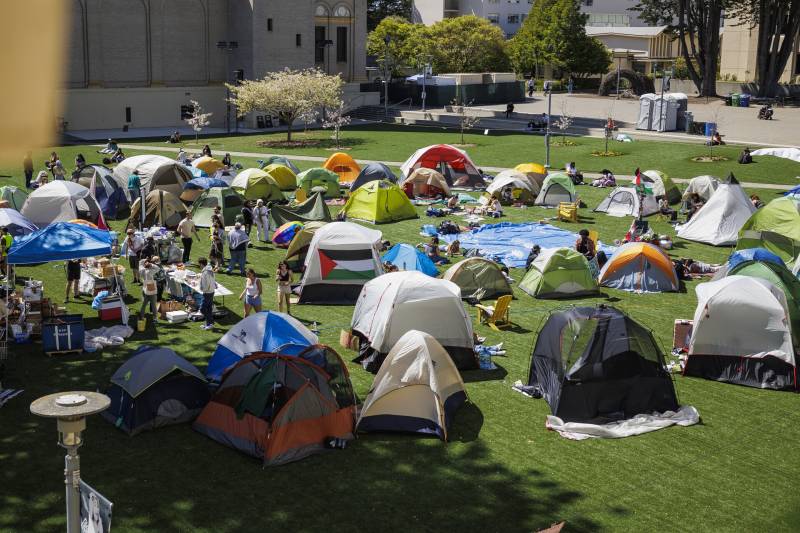The encampment began to voluntarily disband on Monday. University officials said they cleared out abandoned tents.
“As we begin the process of repairing the physical damage to our campus and moving forward as a community, it is important to reflect on how we got here: The USF administration worked in good faith with several student leaders throughout the last three weeks against the backdrop of a national movement to push universities to divest from Israel and to declare genocide,” the campus wrote to its students and faculty on its website.
A group of more than 80 faculty members, librarians and staffers at USF said campus administration used “words that misled” in its communications about the encampment.
“‘Graffiti’ was the use of washable chalk, damage included tape residue left on poles, and disruption was exactly the point. Peaceful protests are peaceful but serve a disruptive purpose,” the group calling itself Educators for Justice in Palestine wrote to school leaders.
In some ways, the USF students’ demands echoed those of student protesters across the state: they wanted the university to be transparent about its investments and to divest from companies or organizations with ties to Israel, as well as to call the war in the Gaza Strip a genocide. USF leadership committed to establishing a “new socially responsible” advisory investment task force composed of students, faculty and staff, according to a university statement, but declined to declare the war a genocide.
USF student protesters also wanted the private Jesuit university to end its participation in the Beyond Bridges Israel-Palestine program. Students from USF in the summer “visit Israel and Palestine, exploring this region with local scholars, religious and political leaders, and activists” to explore long-term solutions to end conflict, according to a program brochure (PDF). A page detailing the program on USF’s website is inaccessible.
“We want to be able to end that program and instate a Palestinian studies program here at our school where it’s taught by Palestinian professors to provide the same foundation as this trip, that they say is so transforming, here at USF,” Steyteyieh said. “We should be hearing what it’s like to be a Palestinian diaspora. We want to end all normalization of the state of Israel at our school.”
For Steyteyieh, the protest is personal. A Palestinian who was raised in Napa, she said her mother survived an Israeli bombing that killed members of her family, including a grandmother, aunt and uncle, in Beirut in 1978. Steyteyieh counts two aunts among her family living in the West Bank, who she said have experienced fear from armed Israeli forces.
“This is a generational cause,” she said. “We just want the school to know at the same time that we’re going to be back, we’re definitely not over, and that we’re going to get our demands met.”

